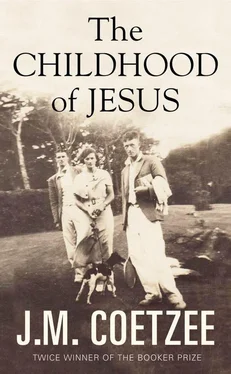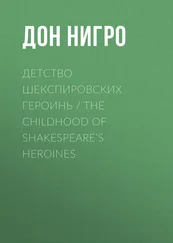‘Is there really barbed wire?’ the woman repeats.
‘There is barbed wire,’ the boy says slowly. ‘I walked through the barbed wire.’
The woman shakes her head, gives a little smile of disbelief. ‘David,’ she says softly, ‘you know and I know that that is a fib. There is no barbed wire at Punto Arenas. I invite you all to come and see for yourselves. We can get in the car and drive there this minute. No barbed wire, none.’
‘I don’t need to see,’ says Inés. ‘I believe my child. If he says there is barbed wire, then it is true.’
‘But is it true?’ says the woman, addressing the boy. ‘Is it real barbed wire, that we can see with our own eyes, or is it the sort of barbed wire that only certain people can see and touch, certain people with a lively imagination?’
‘It is real. It is true,’ says the boy.
A silence falls.
‘So this is the issue,’ says the woman at last. ‘Barbed wire. If I can prove to you that there is no barbed wire, señora, that the child is just making up stories, will you let him go?’
‘You can never prove that,’ says Inés. ‘If the child says there is barbed wire then I believe him, there is barbed wire.’
‘And you?’ asks the woman.
‘I believe him too,’ he, Simón, replies.
‘And you, señor?’
Eugenio looks uncomfortable. ‘I would have to see for myself,’ he says at last. ‘You can’t expect me to commit myself, sight unseen.’
‘Well, we seem to be at an impasse,’ says the woman. ‘Señora, let me put it to you. You have two choices: either you obey the law and release the child to us, or we are forced to call in the police. Which is it to be?’
‘Over my dead body will you take him away,’ says Inés. She turns to him. ‘Simón! Do something!’
He stares back helplessly. ‘What must I do?’
‘This will not be a permanent separation,’ says the woman. ‘David can come home every second weekend.’
Inés is grimly silent.
He makes a last appeal. ‘Señora, please reflect. What you are proposing to do will break a mother’s heart. And for what? Here we have a child who happens to have ideas of his own about, of all things, arithmetic — not history, not language, but humble arithmetic — ideas that he will very likely grow out of before long. What kind of crime is it for a child to say that two and two make three? How is it going to shake the social order? Yet for that you want to tear him away from his parents and lock him up behind barbed wire! A six-year-old child!’
‘There is no barbed wire,’ the woman repeats patiently. ‘And the child has been referred to Punto Arenas not because he can’t do sums but because he is in need of specialized care. Pablo,’ she says, addressing her silent companion, ‘wait here. I would like to have a private word with this gentleman.’ And to him: ‘Señor, can I ask you to come with me?’
Eugenio takes his arm but he brushes the young man off. ‘I am all right, thank you, as long as I don’t have to hurry.’ To the woman he explains: ‘I have just come out of hospital. A workplace injury. I am still a little sore.’
He and she are alone in the stairwell. ‘Señor,’ says the woman in a low voice, ‘please understand, I am not some kind of truant officer. By training I am a psychologist. I work with the children at Punto Arenas. During the brief time when David was with us, before he ran away, I took it upon myself to observe him closely. Because — I agree with you — he is very young to be away from home, and I was concerned that he should not feel forsaken.
‘What I saw was a sweet child, very honest, very direct, not afraid to talk about his feelings. I saw something else too. I saw how quickly he was taken to the hearts of the other boys, the older boys in particular. Even the roughest ones. I do not exaggerate when I say they adored him. They wanted to make him their mascot.’
‘Their mascot? The only kind of mascot I know is an animal that you crown with a garland and lead around on a string. What is there to be proud of in being a mascot?’
‘He was their pet, their universal pet. They don’t understand why he ran away. They are heartbroken. They ask after him every day. Why am I telling you this, señor? So that you can understand that from the beginning David found a place for himself in our community at Punto Arenas. Punto Arenas is not like a normal school, where a child spends a few hours each day absorbing instruction, and then goes home. At Punto Arenas teachers and students and advisors are bonded tightly together. Why then did David run away, you may ask? Not because he was unhappy, I can assure you. It was because he has a soft heart and could not bear the thought of señora Inés pining for him.’
‘Señora Inés is his mother,’ he says.
The woman shrugs. ‘If he had waited a few days he could have come home on a visit. Can you not persuade your wife to release him?’
‘And how do you think I should persuade her, señora? You have seen her. What magic formula do you think I possess that will change the mind of a woman like that? No, your problem is not how to take David away from his mother. You have that power. Your problem is that you cannot keep him. Once he makes up his mind to come home to his parents, he will come. You have not the means to stop him.’
‘He will keep running away as long as he believes his mother is calling him. That is why I ask you to speak to her. Persuade her that it is for the best that he come with us. Because it is for the best.’
‘You will never persuade Inés that for her child to be taken from her is for the best.’
‘Then at least persuade her to let him go without tears and threats, without upsetting him. Because, one way or another, he will have to come. The law is the law.’
‘That may be so, but there are higher considerations than obeying the law, higher imperatives.’
‘Are there indeed? I would not know. For me, thank you, the law is enough.’
The two officers are gone. Eugenio is gone. The driver is gone too, his commission unfulfilled. He is left with Inés and the boy, safe for the present behind the locked door of his old apartment. Bolívar, his duty done, has returned to his post in front of the radiator, from where he gravely watches and waits, his ears pricked for the next intruder.
‘Shall we sit down and discuss the situation calmly, the three of us?’ he suggests.
Inés shakes her head. ‘There is no time for yet more discussions. I am going to phone Diego and tell him to fetch us.’
‘Fetch you and bring you to La Residencia?’
‘No. We are going to drive until we are beyond the reach of those people.’
No long-term plan, no ingenious scheme of escape, that much is clear. His heart goes out to her, this stolid, humourless woman whose life of tennis parties and cocktails at dusk he turned upside down when he gave her a child; whose future has now shrunk to driving aimlessly around back roads until her brothers get bored or their money runs out and she has no choice but to return and surrender her precious cargo.
‘How would you feel, David,’ he says, ‘about going back to Punto Arenas, just for a while — going back and showing them how clever you are by coming top of the class? Show how you can do sums better than anyone else, how you can obey the rules and be a good boy. Once they have seen that, they will let you come home, I promise you. Then you can lead a normal life again, the life of a normal boy. Who knows, maybe one day they might even put up a plaque to you at Punto Arenas: The famous David was here .’
‘What will I be famous for?’
‘We will have to wait and see. Perhaps you will be a famous magician. Perhaps a famous mathematician.’
Читать дальше












